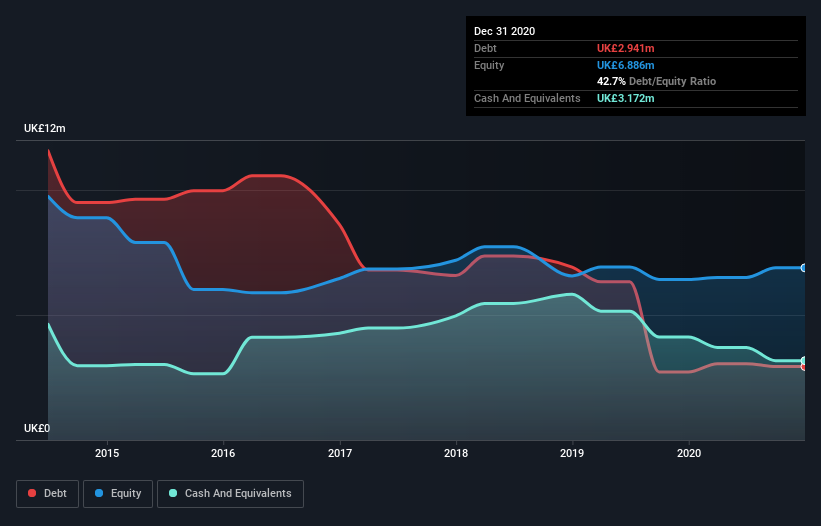- United Kingdom
- /
- Professional Services
- /
- AIM:PTY
We Think Parity Group (LON:PTY) Can Stay On Top Of Its Debt

Howard Marks put it nicely when he said that, rather than worrying about share price volatility, 'The possibility of permanent loss is the risk I worry about... and every practical investor I know worries about.' When we think about how risky a company is, we always like to look at its use of debt, since debt overload can lead to ruin. Importantly, Parity Group plc (LON:PTY) does carry debt. But is this debt a concern to shareholders?
Why Does Debt Bring Risk?
Debt and other liabilities become risky for a business when it cannot easily fulfill those obligations, either with free cash flow or by raising capital at an attractive price. If things get really bad, the lenders can take control of the business. However, a more usual (but still expensive) situation is where a company must dilute shareholders at a cheap share price simply to get debt under control. Having said that, the most common situation is where a company manages its debt reasonably well - and to its own advantage. The first thing to do when considering how much debt a business uses is to look at its cash and debt together.
Check out our latest analysis for Parity Group
What Is Parity Group's Net Debt?
The image below, which you can click on for greater detail, shows that at December 2020 Parity Group had debt of UK£2.94m, up from UK£2.72m in one year. But on the other hand it also has UK£3.17m in cash, leading to a UK£231.0k net cash position.

A Look At Parity Group's Liabilities
Zooming in on the latest balance sheet data, we can see that Parity Group had liabilities of UK£8.01m due within 12 months and liabilities of UK£129.0k due beyond that. Offsetting these obligations, it had cash of UK£3.17m as well as receivables valued at UK£5.90m due within 12 months. So it can boast UK£930.0k more liquid assets than total liabilities.
This short term liquidity is a sign that Parity Group could probably pay off its debt with ease, as its balance sheet is far from stretched. Simply put, the fact that Parity Group has more cash than debt is arguably a good indication that it can manage its debt safely.
Shareholders should be aware that Parity Group's EBIT was down 50% last year. If that decline continues then paying off debt will be harder than selling foie gras at a vegan convention. The balance sheet is clearly the area to focus on when you are analysing debt. But ultimately the future profitability of the business will decide if Parity Group can strengthen its balance sheet over time. So if you're focused on the future you can check out this free report showing analyst profit forecasts.
Finally, while the tax-man may adore accounting profits, lenders only accept cold hard cash. While Parity Group has net cash on its balance sheet, it's still worth taking a look at its ability to convert earnings before interest and tax (EBIT) to free cash flow, to help us understand how quickly it is building (or eroding) that cash balance. Over the last three years, Parity Group actually produced more free cash flow than EBIT. That sort of strong cash conversion gets us as excited as the crowd when the beat drops at a Daft Punk concert.
Summing up
While it is always sensible to investigate a company's debt, in this case Parity Group has UK£231.0k in net cash and a decent-looking balance sheet. The cherry on top was that in converted 212% of that EBIT to free cash flow, bringing in -UK£450k. So we don't have any problem with Parity Group's use of debt. There's no doubt that we learn most about debt from the balance sheet. However, not all investment risk resides within the balance sheet - far from it. For instance, we've identified 2 warning signs for Parity Group that you should be aware of.
At the end of the day, it's often better to focus on companies that are free from net debt. You can access our special list of such companies (all with a track record of profit growth). It's free.
If you decide to trade Parity Group, use the lowest-cost* platform that is rated #1 Overall by Barron’s, Interactive Brokers. Trade stocks, options, futures, forex, bonds and funds on 135 markets, all from a single integrated account. Promoted
New: Manage All Your Stock Portfolios in One Place
We've created the ultimate portfolio companion for stock investors, and it's free.
• Connect an unlimited number of Portfolios and see your total in one currency
• Be alerted to new Warning Signs or Risks via email or mobile
• Track the Fair Value of your stocks
This article by Simply Wall St is general in nature. It does not constitute a recommendation to buy or sell any stock, and does not take account of your objectives, or your financial situation. We aim to bring you long-term focused analysis driven by fundamental data. Note that our analysis may not factor in the latest price-sensitive company announcements or qualitative material. Simply Wall St has no position in any stocks mentioned.
*Interactive Brokers Rated Lowest Cost Broker by StockBrokers.com Annual Online Review 2020
Have feedback on this article? Concerned about the content? Get in touch with us directly. Alternatively, email editorial-team (at) simplywallst.com.
About AIM:PTY
Flawless balance sheet low.
Market Insights
Community Narratives




